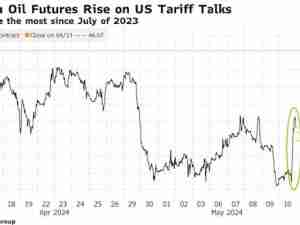First Lumber, Now Drywall as Canada-U.S. Trade Tensions Escalate
By: Katia Dmitrieva | Nov 23 2016 at 12:00 AM | International Trade
A new trade dispute has broken out between Canada and the U.S. that threatens to raise prices in Canada’s already overheated housing markets.
The Canada Border Services Agency imposed a provisional tariff as high as 277 percent on U.S. drywall imports in September after ruling that manufacturers were dumping the product, or selling it below the price in their home market, undercutting local suppliers.
The tariff has raised the price of drywall, or gypsum board as it’s also called, by as much as 30 percent and is causing “chaos” and delays as contractors scramble for alternative sources. Some builders say the tariff could add as much as C$13,000 ($9,671) to the cost of a new home, which would amount to a C$2.6 billion increase to the roughly 200,000 homes built in Canada each year.
“Nobody’s going to be happy about being told there’s a significant price increase,” said Nathan Stone, 36, a builder based in Chilliwack, British Columbia whose company, Odessa Group, erects about 50 homes a year. “They’ve created a highly punitive tariff where it’s completely impossible to buy U.S. drywall.”
New Relationship
The drywall spat is the latest irritant facing Canada and the U.S. as they try to forge a new cross-border relationship under Donald Trump, who was elected U.S. president on a promise to toughen up trade deals. Canada and the U.S. are already embroiled in a dispute over softwood lumber. The two countries failed to agree on an accord in October that would have allowed tariff-free imports from Canada, and U.S. firms are now lobbying to cut Canada’s share of its market.
“It’s certainly interesting this has come in amid the lumber-trade dispute,” Bob Finnigan, president of the Canadian Home Builders’ Association and a principal of real estate developer Heron Group of Companies, said in Bloomberg’s Toronto office Nov. 8. “This is the issue our entire industry is focusing on now. It has the potential to affect billions of dollars of building contracts.”
Canada Border Services, which will issue a final report on the dumping on Dec. 5, and the Office of the U.S. Trade Representative declined to comment on the tariff. Finance Minister Bill Morneau has asked the Canadian International Trade Tribunal to fast-track a study on the impact of the duties. The study is due by Jan. 4, the same day the tribunal issues a final ruling on the tariff. Morneau has final say on what duties are applied.
‘Public Interest’
“Ensuring fair trade practices is important, but delays in reconstruction are a serious concern,” Morneau said in the House of Commons last month. “That is why I have asked the Canadian International Trade Tribunal to investigate whether or not tariffs are in the public interest immediately, instead of after its final determination is made.”
In Alberta, construction companies are trying to rebuild Fort McMurray, a city ravaged by wildfires this year. Canadians are also facing soaring house prices in many cities. The average price of a detached house in downtown Toronto jumped 26 percent in October from the prior year to C$1 million amid a record number of sales. Vancouver has the highest home prices in the country, with the average detached home costing C$1.6 million, exacerbated by a supply shortage.
Wholesalers including Mississauga, Ontario-based CGC Inc. have already increased their prices for certain panel products by as much as 30 percent, documents sent to contractors show. Canada imported about C$277 million worth of lime and gypsum products last year, about 97 percent of it from U.S. manufacturers, according to Statistics Canada.
‘Causing Chaos’
“It’s causing chaos in the market,” Cyndee Todgham Cherniak, founder of LexSage, a law firm in Toronto that specializes in international trade law, said by phone Nov. 21. Her firm is representing one of the U.S. manufacturers slapped with the tariff. “There are examples of issues where people can’t get drywall. So then painters can’t paint the wall, installers can’t install lights, can’t install kitchen cabinets, or the countertops.”
The tariff was imposed this year after Canada’s largest drywall maker, CertainTeed Gypsum Canada Inc., filed a complaint to border services in April that they were being injured due to U.S. dumping. The department launched an investigation with an initial finding that the foreign firms were, indeed, dumping.
“No company in Canada can compete against U.S. products dumped at such a low price levels,” Matt Walker, general manager of Mississauga-based CertainTeed Gypsum Canada, said in an e-mail statement through an external spokesman. U.S. companies have been selling product in Canada at as much as half the price they sell it south of the border, he said, which threatens CertainTeed’s three production facilities and about 200 jobs in Canada, he said. “We hope that Canada stands firm for free and fair trade and a level playing field.”
Hurt Consumer
CertainTeed Gypsum Canada is a unit of Malvern, Pennsylvania-based CertainTeed Corp., which in turn is a subsidiary of France’s Cie de Saint-Gobain. Walker said in September that U.S. imports account for more than half the Western market in Canada.
Meanwhile Stone is bracing for a financial hit. Like most developers, he sells properties months before building them, so he’ll have to absorb the cost this year, which he expects to amount to about C$100,000.
“In the end it’s going to hurt the consumer,” Stone said. “The reality is that next spring when I start selling houses, the exact same house that I sold for this many dollars today it’s going to go up by ten or fifteen thousand dollars.”








